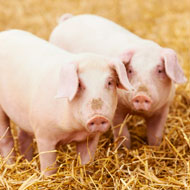Pig farmers urged to speak to their banks

Most pig keepers will be operating in the red for some or all of this year.
The National Pig Association are urging farmers to speak to their banks 'sooner rather than later', as Farmgate prices for pigs fall to their lowest level for eight years.
The organisation say that most pig keepers will be operating in the red for some or all of this year, attributing the fall to higher output and Russia's embargo on EU pigmeat.
"Some producers may not be aware how much banking culture has changed since they last needed to renegotiate overdraft agreements, or apply for a long-term loan," said NPA vice-chairman Richard Longthorp.
"Local managers have far less freedom and flexibility and consequently putting new arrangements in place can now be a lengthy process, involving policy makers further up the banking food chain," he added.
British pig producers currently need 139p a kilo to cover all their costs, including reinvestment. However, the current Standard Pig Price has now fallen to less than 122p a kilo, putting 'serious pressure' on cash flows, even when maintenance and reinvestment have been put on hold.
Despite low prices for feed, most British producers make a cash loss on every pig they sell. However, they are still better placed than those in the continent, as British pork attracts 20p-30p a kilo premium.
The NPA say that although some of this can be attributed to the strength of the euro (making imported pigment cheaper), a significant part is created by the British pig industry's higher welfare husbandry, which is valued by retailers and consumers.
Seven supermarkets are classed as "hundred-percenters" by NPA, as they continue to source 100 percent British fresh pork. These are Aldi, the Co-op, M&S, Morrisons, Sainsbury's and Waitrose.
NPA chief executive Dr Zoe Davis said: "We'd like to remind all retailers that British pig producers have a world-wide reputation for their high welfare.
"For instance, most continental pig producers still confine sows in steel gestation crates, or 'stalls', for part of the time, whereas they have been outlawed on British farms for 16 years."
NPA chairman Richard Lister added: "Producing high-welfare pigs outdoors or on straw carries a significant cost disadvantage and retailers must be mindful not to kill the golden goose.
"If they do, they will have to let down their suppliers and they will have let down their customers who continue to demonstrate they want reasonably priced high-welfare, quality-assured British pork."



 The latest
The latest